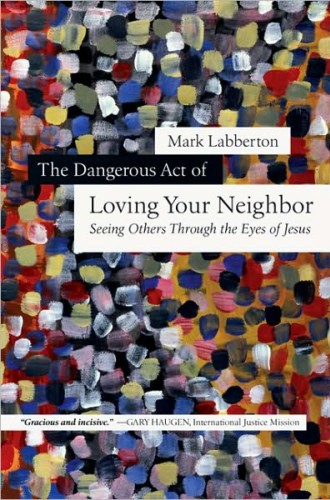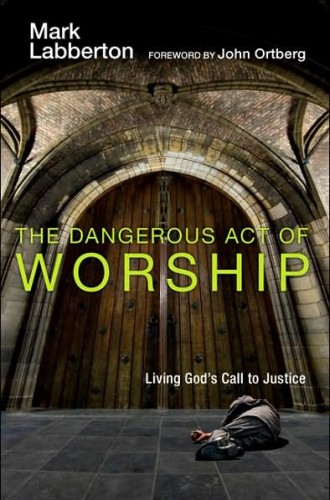The Dangerous Act of Loving Your Neighbor and The Dangerous Act of Worship, by Mark Labberton
Mark Labberton doesn't want you to read his new book The Dangerous Act of Loving Your Neighbor in the traditional way. "The goal," he explains, "is not to finish this book, but to seek a transformed heart that is filled with God's joy."
This counsel is one of the many expressions of Labberton's pastoral spirit that pepper this provocative, incisive book. Most of the truths he tells are painful; most of them are also necessary if we're to grow in love. The reader will encounter hope and encouragement along the way, but only with patience.
The right way to read Loving Your Neighbor is in small bites, with plenty of chewing, musing, prayer and discussion between tastes. Studied correctly, it can help a congregation experience profound insight into both God's character and our practical response to God's mission in the world.
Read our latest issue or browse back issues.
Labberton argues that radical, individual heart change is a necessary, though not sufficient, condition for the advancement of justice. Injustice thrives because too many of us do nothing about it. He diagnoses the reasons for our complacency: we fail to hold injustice "clearly, unmistakably, and urgently in our field of vision." There is great distance between the privileged world we inhabit and typically take for granted and that other world where tragedy, disease, destitution and oppression are rife. We misperceive suffering as their problem, not ours. We live "with a clear conscience, believing that we are not the perpetrators of injustice while also believing that injustice is beyond our power to change. We think this is just the way things are." But, Labberton reminds us, "the consistent witness of Scripture is that each of us is, in all times and places, implicated, deeply implicated, in the problem of injustice."
Ah. Now we see why the title has the word dangerous in it. If the problem is actually our problem, we're responsible for doing something about it. Labberton calls us to begin with the internal, and this is what sets his book apart from most other social justice literature. He calls believers to enter more deeply into the heart of Jesus. This is no simplistic call to personal piety. It is a call to respond to Jesus' invitation to join his heart. When we make our home there, we find that it's a place far more diversely populated than we might have preferred. All sorts of unfamiliar others reside there; needy people, individuals we want to name "sinner" or "statistic" or "sad story" so we won't have to be inconvenienced by them. The heart of Jesus feels like a scary place.
But Jesus' heart is also restful and safe because it's the only place where we are truly seen and accurately named, where our deepest longings—to be known, to be accepted, to be cherished--are met. Labberton wants us to go there daily in private and corporate worship so we can begin to act as people who call the heart of God our home address.
Living in God's heart will never happen naturally; it requires deliberate effort and exercise. Here I wish that Labberton had provided more practical advice, but he does offer several helpful pointers. He counsels readers to write God a letter about the state of their hearts and about the changes needed to make their hearts more like Jesus' heart. To avoid paralysis, Labberton suggests, we should select just one issue of injustice to study and track. He also invites readers to list "those who matter in your social environment and those who matter to the kingdom of God" and then ask, "How similar and different are these lists?" Most important, he invites us to meditate on scriptural texts that remind us of God's deep, unconditional love and powerful ability to right all the world's wrongs. This quells unproductive guilt and reassures us that we don't need to be the world's savior.
Labberton also shares anecdotes about corporate exercises that nurture heart change. For example, his congregation (First Presbyterian in Berkeley, California) invited a Ugandan bishop to tell them about children vulnerable to capture by rebels in the Lord's Resistance Army. This talk led to practical actions—but only because the speaker reframed church members' thinking about these kids. "You won't know what to do," the bishop explained, "until they are first your children."
To cultivate that mind-set, members posted photographs of the children around the sanctuary. Corporate worship regularly involved prayer for them. Following Labberton's example, some parishioners began subscribing to Ugandan newspapers online to stay informed and wrote letters to politicians to express their concerns. One member's heart was pierced by the tragedy of girls captured by the LRA and sexually brutalized. She led an initiative to craft handmade quilts to send to them at a rehabilitation hospital in Goma, Uganda, that the church supports. Prior to shipping, the quilts were draped over the pews in the sanctuary, and members were invited to "wrap themselves in these expressions of God's beauty and love" and in silence to imagine the recipients wrapped in a dignifying, loving embrace.
Activities like these on Sunday mornings will take place, though, only if preachers grasp just what's at stake in worship and understand what worship that God accepts looks like. Helpfully, Labberton has already told pastors much of what they need to know about worship in an earlier book, The Dangerous Act of Worship: Living God's Call to Justice.
There he explains, "The crisis the church currently faces is that our individual and corporate worship does not produce the fruit of justice and righteousness that God seeks." Worse, our worship often fosters "the self-indulgent tendencies of our culture rather than nurturing the self-
sacrificing life of the Kingdom of God." Pastors, Labberton counsels, need to leave the worship wars over musical styles behind them and get focused on what truly matters: avoiding the divorce of worship and justice that Isaiah 1 so powerfully denounces. With intentionality and creativity, corporate worship can nurture believers in the ability to love the God of justice and to participate actively in the dangerous act of loving our neighbors.
The call to worship, Labberton writes, can remind us weekly that God is the power above all others. The prayer of confession can encourage us to admit our destructive uses of power and privilege. The Lord's Supper can remind us that King Jesus used his power to serve. Baptisms can remind us of how God mercifully renames us—and can challenge us to rename others whom we would otherwise misname or ignore. Musical elements of the service can steward our emotions in ways that help us to love mercy and do justice. Good music "can reawaken our voice, ignite our righteous anger, . . . intensify our resolve."
In addition, pastors must model personally what they want to see developed in their flock. Labberton did this by reading an update from missionary friends in Cambodia every Sunday morning. This allowed him to lead worship "with my heart freshly reminded of the realities of suffering in the world." He donates the same amount of money he spends on books for himself to purchase texts for pastors in the less developed world. He reads the prophets often and travels to see firsthand the work of various Christian ministries. As parishioners imitate such disciplines or craft others, God's transforming grace finds new on-ramps into the heart of the congregation.
Additional practical advice will be forthcoming soon as Labberton assumes his post at the new Lloyd John Ogilvie Institute of Preaching at Fuller Seminary. The institute's website will showcase examples of congregations where preaching and liturgy lead to heart transformation that provokes creative action.
Labberton's two books go a long way toward describing the sort of "walking humbly with our God" that makes it possible to do justice and love mercy. He shows us that the Micah 6:8 lifestyle is plausible—but only when the internal precedes the external. The really hard work isn't the advocacy campaign, the short-term missions trip or the canned-food drive—or even adopting AIDS orphans or making radical financial investments in aftercare for children rescued from sex trafficking. All such actions have their place. But the really dangerous labor is that spoken of by Meister Eckhart in the epigraph to Labberton's new book:
The outward work can never be great or even good if the inward work is puny or of little worth. The inward work invariably includes in itself all breadth, all expansiveness, all length, all depth. Such a work receives and draws all its being from nowhere else except from and in the heart of God.







